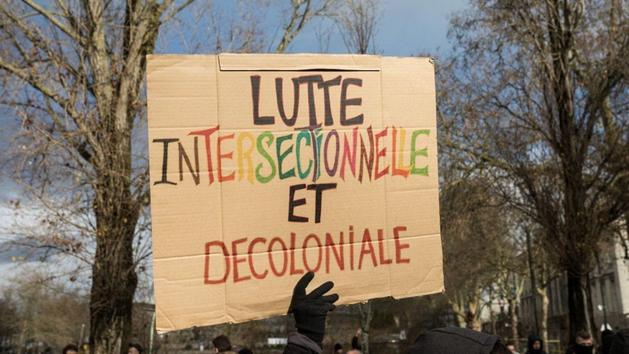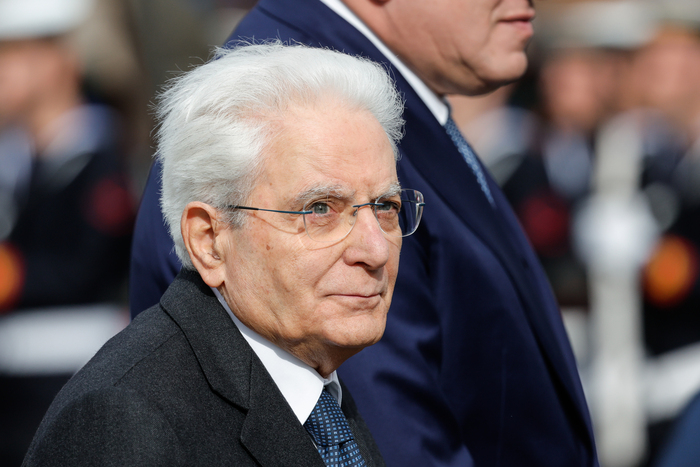Anne-Sophie Nogaret is professor of philosophy and Sami Biasoni is lecturer at ESSEC, doctoral student in philosophy at the École normale supérieure. They co-wrote French in spite of themselves, Racialists, decolonialists, indigenists: those who want to deconstruct France(editions of L'Artilleur, 2020).
FIGAROVOX. - Your book, "French despite them", is captioned: "Racialists, decolonialists, indigenous people: those who want to deconstruct France". Can you explain the difference between these three terms?
Sami BIASONI. - Although there is a frequent tendency to amalgamate them, it is indeed three terms which designate movements certainly local, but nevertheless different. Racialism corresponds to the set of ideological discourses - and the political demands which emanate from them - established on the basis of the postulate of the preeminence of the notion of “race” in human experience. In its historical meaning, defended by the authors of the 19th century (Vacher de Lapouge, Gobineau…), racialism was mainly a matter of biological differentiation between individuals; henceforth it relates to “race” perceived both as a social construct and as a synthesis of real or fantasized subjective perceptions. So racialism no longer considers that it is enough for an individual to have a "black" skin color to call himself "black". It is also paradoxically what allows this same doctrine to consider that in the West any "white" person occupies a position of latent domination, notwithstanding the reality of their social status or their psychological development.
Decolonialism, for its part, considers that the process of decolonization which structured world history in the second half of the 20th century is incomplete. If, to use the declarations of the Bandung Conference of 1955, "the [political] submission of peoples to the yoke of foreigners, to their domination and their exploitation" is legally void, some argue that it continues through economic (capitalism), cultural (soft power) or even representational imperialism for the benefit of the West. I analyze decolonialism as the active and militant side of post-colonialism which, for its part, seeks to think and theorize the deconstruction of the aforementioned hegemony.
Finally, we can say of indigenism that it is, in essence, decolonial. The original indigenism aimed to establish the conditions for cultural and political sustainability of the indigenous populations on the South American continent. In France, it refers rather to the Codes of the Indigénat of the last century, corpus of colonial law governing the status of the populations living in the French territorial possessions - populations whose descendants of immigrants born on our territory would today carry the atavistic burden. by the sole fact of their birth.
You write that the French Theory had difficulty in settling in France, when it was already influencing the world across the Atlantic. How did these decolonial theories finally succeed in establishing themselves in our society?
SB - Many are unaware of it, but the philosophical materialist Marxist culture of the French university contributed, by conservatism (trivially linked to the refusal of the submersion of the "class" by the "race"), to the slowing down of the penetration of the concepts from the French Theory in our intellectual debate. We also owe to the attraction exerted by the “New Philosophy” (embodied by André Glucksmann, Christian Jambet and Bernard-Henry Lévy) - for its part criticism of the excesses of Stalinism or Maoism - the relative failure of post-structuralist thought in France. At the same time, the first departments dedicated to x-studies were born on American campuses , these disciplines placing at the heart of their analyzes the notions of “race”, “gender” or “subalternity”. In these years, the French University also retained a rationalist tradition attached to argumentative rigor and relative conceptual parsimony. Conversely, the French Theory defended a so-called “literarist” approach, both prolix and metaphorical; this is also what explains the French reluctance towards it, and concomitantly its opportunistic adoption across the Atlantic.
The influence of American academic journals in the social sciences served as a support for the infusion of postcolonial theses in France. Similarly, cinema and more recently American series have contributed to the spread and normalization of “minority” discourse.The influence of American academic journals in the social sciences served as a support for the infusion of postcolonial theses in France. Similarly, cinema and more recently American series have contributed to the spread and normalization of “minority” discourse. Their acceptance has also been made possible, even facilitated, by numerous historical renouncements over the last decades: the abandonment of the assimilationist model, the constitution of a community anti-racism (that of the PIR, the CRAN or even the CCIF) and the pusillanimity of political power vis-à-vis the affirmation of any national "pride" constitute the essential milestones underlying the reception of racialist and decolonialist theses in France.
Do you think that racialism, but also gender theory, or even animalism, are avatars of deconstructivism?
Anne-Sophie NOGARET. - If racialism did not wait for French Theory and deconstructionism to be theorized, as the theses of Gobineau and his epigones prove, this is not the case with the question of gender which, for its part, appears to the contemporary era. Gender, independent of the biological sex, would designate a social norm expressed through decoys (the categories of feminine and masculine), secularly distilled for hidden issues of… masculine domination. The current passion for “deconstructing gender stereotypes” thus aims to flush out this domination, all the more perverse in that it is unconscious. Beauvoir's famous phrase "We are not born a woman, we become it" expressed the beginnings of this. Gender theory was then developed and diffused in the wake of deconstructionism, pushed to its paroxysm by Judith Butler, who affirms that being a man or a woman is the choice of the individual, therefore detached by the simple declarative effect of his biological reality.
The deconstructionists, who in reality refer more to Foucault than to Derrida, analyze all social (and therefore human) reality in terms of domination: standards, hierarchy, restraint, prohibitions, the law in a word would be the expression even domination. However, in nature there are only blind forces defining the possible or the impossible. The norm and the law do not apply. Even if they do not necessarily claim it, the antispeciesists therefore fit into the deconstructionist logic: they deny the specific nature of man, conscious, endowed with free will, rational and the superiority that this rational consciousness implies towards the others alive. They therefore deny what constitutes the essential border between humanity and animality, between nature and culture.
The deconstructionists, who in reality refer more to Foucault than to Derrida, analyze all social (and therefore human) reality in terms of domination: standards, hierarchy, restraint, prohibitions, the law in a word would be the expression even domination.Deconstruction, as expounded by Derrida, originally aimed at a certain interpretation of texts. It has been misguided to practice now on categories, standards, prohibitions, ultimately on what is called anthropological foundations. The human being, whose body itself no longer really fits into the biological sphere since it can choose its "gender" (which therefore again becomes an artificially constructed sex), is no longer a being of reason either. being part of the culture, since the founding and humanizing value of the norm and the prohibition is denied.
For my part, I see in the deconstructionism at work today a perverse motive which would arise more from a psychic disorder than from a theoretical reflection: it is actually a question of legitimizing the free exercise of one's impulses, which would become authentic “standards” since they are supposedly free from all traces of domination.
As for racialism, it does not participate in my strict sense of deconstructionist logic, even if it borrows from it, because, whatever one thinks of it from a moral point of view, it does not call into question the anthropological foundations. If, as Levi-Strauss has described it, each society is naturally inclined to regard itself as the only truly human one, it is because racism and ethnocentrism are phenomena inherent in humanity. Racialism, while it is opposed to universalism, does not however call into question the specific place of man in nature, nor the need for standards and prohibitions within a society. The racialists of today are also far from wanting to "deconstruct" the concept of race! Whatever they say, they intend on the contrary to make it a distinctive criterion giving them access to privileges and power, supposedly in compensation for the trauma suffered… in the name of the race.
The French title of Agatha Christie's famous novel, "Les Dix Petits Nègres" has been changed, it is now called "They were ten". Have culture and language been abandoned to what you call “minority tyranny”?
SB - Fortunately they have not been abandoned, but each day brings us its sad share of new renouncements. The French exception of which we were once so proud is now bending under the weight of the most radical demands, and we let it happen. Totalitarianisms have always considered that it is necessary, in the name of Good, to purge the language and the culture of their "slags". Who can believe that the frenzied exercise of “political correctness” set up as a norm in American institutions and media since the 1970s has helped to calm the political debate across the Atlantic?
The statues that we debunk, the words that we erase, the syntax that we manipulate are all translations of our passivity in the face of a slow movement of destabilization of our unity, even of our national harmony.Each docile acceptance opens the way to ever more intrusive demands: such is the natural course of minority domination, the engine of which is none other than the conquest of new rights to the detriment of others. The militancy that we have to face no longer bothered with the complexity of reality because it reasons from categories as simplistic as they are artificial. The act of censorship constitutes the ultimate process of the deconstructivist approach: what we cannot undo through Reason becomes so through the use of coercion. The cancel culture that begins to horrify even the most progressive left in the United States proceeds from the same springs as all totalitarianisms in history: by the negation of the free thought of the other and by the erasure of this which hinders the defended doctrinal project. The statues that we debunk, the words that we erase, the syntax that we manipulate are all translations of our passivity in the face of a slow movement of destabilization of our unity, even of our national harmony. Our Republican tradition teaches us to understand the demands that some defend, to accept democratic debate while vigorously reaffirming what we believe in. Liberty and fraternity come at this price.
To what extent has the notion of general interest given way to particularist claims?
A.-SN - Basically, the feminist, LGBT, indigenous demands that are present in the news are not really particularistic. Because a particularity (being a woman, being homosexual, being black) is not in itself linked to domination, as the activists claim, who, their trauma of being dominated over the shoulder, say they want “justice”. A feature is moreover itself divisible into multiple sub-features. Intersectional discourse is based on a conception that abolishes the subject as a conscious unit. The subject no longer exists, fragmented, reduced to being only an addition of suffered traumas, which are not the result of life or chance, but of external mechanisms of domination.
Intersectional discourse is based on a conception that abolishes the subject as a conscious unit. The subject no longer exists, fragmented, reduced to being only an addition of suffered traumas, which are not the result of life or chance, but of external mechanisms of domination.This fragmentation destroys the identity of the subject ( idem means "the same") while claiming it. In the name of the symbolic “violence” that he collects and by which he defines himself, the individual claims “rights”. These "rights", which concern only him and his own instinctual demands which he intends to make a norm, stem from an obvious abuse of language and a manifest perversion of what the law is. This is undoubtedly the unacknowledged principle of these claims: the ideological and political seizure of power by the individual who considers that reality (biological and anthropological) does not exist and that only drives similar to his are worth. In such a system of representations, the notion of general interest is necessarily dissolved.
Are we moving towards the dislocation of French republican universalism and the advent of a multicultural and communitarian society in France?
A.-SN - We are already there. A multicultural society can exist in a relatively peaceful way only because one of the communities asserts itself and behaves as first, superior and central. In Georgia, for example, which is a multicultural society, the dominant paradigm is clear and assumed: Georgians are extremely proud of their roots, their history and their religion and will not be overwhelmed by the ethnic groups present secularly in the country. . In France, where the ethnico-religious criterion did not exist politically until a few decades ago, universalism organized law and life in society. But universalism is no longer supported by the state and the institutions, which practice ethno-differentialism without saying so openly. As a result, the community which tends to impose itself, because it is its nature and because it does not meet with opposition, is the one which asserts itself of political Islam.












/cloudfront-eu-central-1.images.arcpublishing.com/prisa/KMEYMJKESBAZBE4MRBAM4TGHIQ.jpg)


